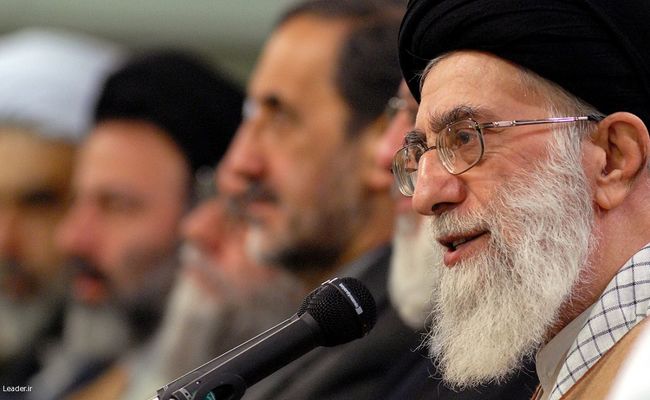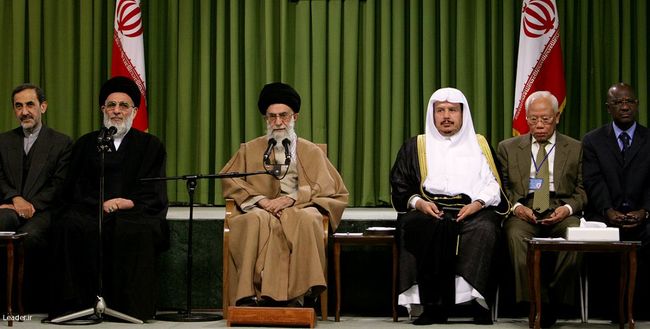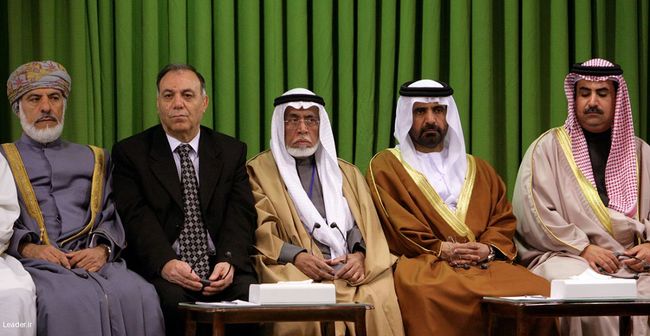Islamic Revolution Leader Ayatollah Sayed Ali Khamenei told a convention of senior judicial authorities of the Islamic countries in Tehran Wednesday that the statute of Islam can capably attend to the modern day human expectations, especially the demand for justice.
Ayatollah Khamenei observed that the solution to the Muslim world problems lies in self-confidence and reliance on God, urging the Islamic judicial bodies to make a return to the Divine judicial law and renovate the sublime foundation of Islamic jurisprudence.
The IR Leader viewed Tehran conference of Islamic judicial authorities as conducive to further exchange of views among the Muslim scholars and Alims (scholars of Islamic studies).
"The Islamic Umma (community) must grab every opportunity at hand to enhance internal bonds and promote good intention until the aspirations of the world of Islam are realized," Ayatollah Khamenei urged.
The Islamic Revolution Leader regarded the Islamic law as one of the most developed law systems in the present day world.
Ayatollah Khamenei regretted that the Western bloc was trying to belittle the Islamic law as being unable to cater to the modern day demands and that the judicial bodies of the Islamic countries had remained impressed by the Western juridical system unlike being in command of the eminent Islamic statute.
Ayatollah Khamenei believed that the absence of justice, security and fraternity and the unfettered rule of superpowers are the fruits of Western cultural dominance over the world.
"Today the world has a thirst for justice and security," Ayatollah Khamenei said.
"Muslims are treated with humiliation and discrimination in the so-perceived civilized countries of the west which profess to enjoy freedom of thought. In the Islamic countries, including Iran, however, the religious minorities are living a tranquil life and are free to observe their religious practices," Ayatollah Khamenei distinguished.
The Islamic Revolution Leader then underlined that the Western culture and civilization could not secure justice and security for human being whereas the high-status Islamic laws could secure the acute demands of humanity, including justice.
Ayatollah Khamenei identified the Western domineering attitude, the Zionist aggression against the Palestinian people and the silence of the western-civilization-gripped world as among the existing discriminations in the world.
"In these conditions, the Muslims must confidently and unanimously take measures through reliance on God. The God too has pledged Its Assistance whenever an idea is aptly dealt with," Ayatollah Khamenei recommended.
The IR Leader at the end of his remarks urged the Muslim judicial authorities to do follow-ups for the decisions they made in Tehran conference.
Early in the meeting and prior to the IR Leader remarks, the IRI Judiciary Chief, Ayatollah Hashemi Shahroudi delivered a report to the audience on the conference agenda and decisions.
The Judiciary Chief said that the Articles of Association of the union of Islamic countries judicial bodies would be drawn up in Tehran conference secretariat to be presented for approval to the next edition of the conference set for Saudi Arabia.
Ayatollah Khamenei observed that the solution to the Muslim world problems lies in self-confidence and reliance on God, urging the Islamic judicial bodies to make a return to the Divine judicial law and renovate the sublime foundation of Islamic jurisprudence.
The IR Leader viewed Tehran conference of Islamic judicial authorities as conducive to further exchange of views among the Muslim scholars and Alims (scholars of Islamic studies).
"The Islamic Umma (community) must grab every opportunity at hand to enhance internal bonds and promote good intention until the aspirations of the world of Islam are realized," Ayatollah Khamenei urged.
The Islamic Revolution Leader regarded the Islamic law as one of the most developed law systems in the present day world.
Ayatollah Khamenei regretted that the Western bloc was trying to belittle the Islamic law as being unable to cater to the modern day demands and that the judicial bodies of the Islamic countries had remained impressed by the Western juridical system unlike being in command of the eminent Islamic statute.
Ayatollah Khamenei believed that the absence of justice, security and fraternity and the unfettered rule of superpowers are the fruits of Western cultural dominance over the world.
"Today the world has a thirst for justice and security," Ayatollah Khamenei said.
"Muslims are treated with humiliation and discrimination in the so-perceived civilized countries of the west which profess to enjoy freedom of thought. In the Islamic countries, including Iran, however, the religious minorities are living a tranquil life and are free to observe their religious practices," Ayatollah Khamenei distinguished.
The Islamic Revolution Leader then underlined that the Western culture and civilization could not secure justice and security for human being whereas the high-status Islamic laws could secure the acute demands of humanity, including justice.
Ayatollah Khamenei identified the Western domineering attitude, the Zionist aggression against the Palestinian people and the silence of the western-civilization-gripped world as among the existing discriminations in the world.
"In these conditions, the Muslims must confidently and unanimously take measures through reliance on God. The God too has pledged Its Assistance whenever an idea is aptly dealt with," Ayatollah Khamenei recommended.
The IR Leader at the end of his remarks urged the Muslim judicial authorities to do follow-ups for the decisions they made in Tehran conference.
Early in the meeting and prior to the IR Leader remarks, the IRI Judiciary Chief, Ayatollah Hashemi Shahroudi delivered a report to the audience on the conference agenda and decisions.
The Judiciary Chief said that the Articles of Association of the union of Islamic countries judicial bodies would be drawn up in Tehran conference secretariat to be presented for approval to the next edition of the conference set for Saudi Arabia.



